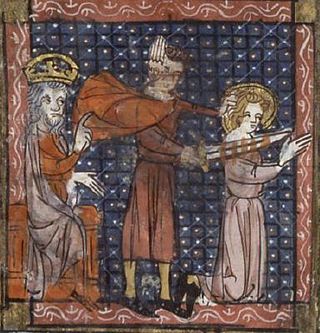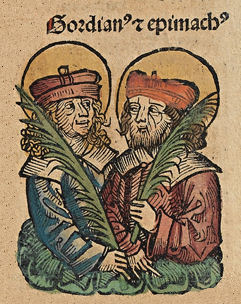Year 362 (CCCLXII) was a common year starting on Tuesday of the Julian calendar. At the time, it was known as the Year of the Consulship of Mamertinus and Nevitta. The denomination 362 for this year has been used since the early medieval period, when the Anno Domini calendar era became the prevalent method in Europe for naming years.
Saint Thomas or St. Thomas may refer to:

In the Catholic Church, the Dicastery for the Causes of Saints, previously named the Congregation for the Causes of Saints, is the dicastery of the Roman Curia that oversees the complex process that leads to the canonization of saints, passing through the steps of a declaration of "heroic virtues" and beatification. After preparing a case, including the approval of miracles, the case is presented to the pope, who decides whether or not to proceed with beatification or canonization.
Saint Stanislaus or Saint Stanisław may refer to:

May 8 – Eastern Orthodox Church calendar – May 10
This article lists the feast days of the General Roman Calendar as they were at the end of 1954. It is essentially the same calendar established by Pope Pius X (1903–1914) following his liturgical reforms, but it also incorporates changes that were made by Pope Pius XI (1922–1939), such as the institution of the Feast of Christ the King, and the changes made by Pope Pius XII (1939–1958) prior to 1955, chief among them the imposition of the Feast of the Immaculate Heart of Mary upon the universal Church in 1944, the inscription of Pius X into the General Calendar following his 1954 canonization, and the institution of the Feast of the Queenship of Mary in October 1954.

Epimachus is a genus of birds-of-paradise (Paradisaeidae) that includes two species, found in the highland forests of New Guinea. They are the largest members of the family. The common name "sicklebill" refers to their long, decurved, sickle-shaped bill.

Saint Gordianus was a Roman martyr who was killed during the reign of Julian the Apostate, and is commemorated on 10 May.
Saint Gordianus and Saint Epimachus of Alexandria were jointly venerated in the Catholic Church on 10 May until 1969.

Epimachus of Alexandria was a Roman martyr who died in 250 during the Decian persecution. He and his companions—Alexander, Ammonarion, Mercuria, Dionysia and other women—were beheaded at Alexandria. They are commemorated on 12 December.
13 Pashons - Coptic calendar - 15 Pashons
Saint Epimachus of Pelusium was an Egyptian martyr.
This article lists the feast days of the General Roman Calendar as approved on 25 July 1960 by Pope John XXIII's motu proprioRubricarum instructum and promulgated by the Sacred Congregation of Rites the following day, 26 July 1960, by the decree Novum rubricarum. This 1960 calendar was incorporated into the 1962 edition of the Roman Missal, continued use of which Pope Benedict XVI authorized in the circumstances indicated in his 7 July 2007 motu proprio Summorum Pontificum for use as an Traditional Roman Mass.
The Tridentine calendar is the calendar of saints to be honoured in the course of the liturgical year in the official liturgy of the Roman Rite as reformed by Pope Pius V, implementing a decision of the Council of Trent, which entrusted the task to the Pope.
Saint John or St. John usually refers to John the Baptist, but also, sometimes, to John the Apostle.

October 30 - Eastern Orthodox liturgical calendar - November 1

March 10 - Eastern Orthodox liturgical calendar - March 12
Saint Gordianus, who with several companions was martyred in Pontus or Galatia.
The Martyrs of Alexandria under Decius were a number of Christians who were martyred in Alexandria, Egypt, under the Roman Emperor Decius . Their feast day is 30 October.
Hathor 3 - Coptic Calendar - Hathor 5
This page is based on this
Wikipedia article Text is available under the
CC BY-SA 4.0 license; additional terms may apply.
Images, videos and audio are available under their respective licenses.




